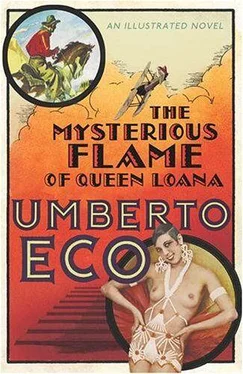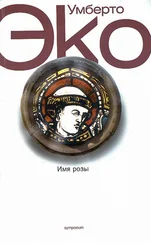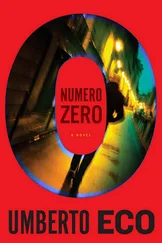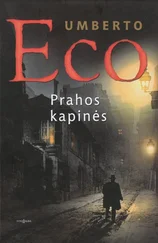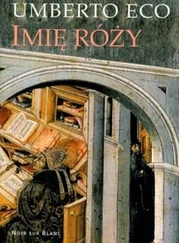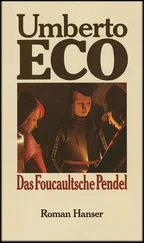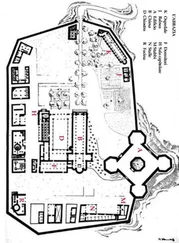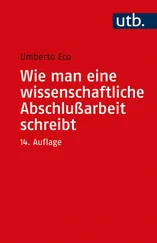Umberto Eco - The Mysterious Flame Of Queen Loana
Здесь есть возможность читать онлайн «Umberto Eco - The Mysterious Flame Of Queen Loana» весь текст электронной книги совершенно бесплатно (целиком полную версию без сокращений). В некоторых случаях можно слушать аудио, скачать через торрент в формате fb2 и присутствует краткое содержание. Жанр: Исторический детектив, на французском языке. Описание произведения, (предисловие) а так же отзывы посетителей доступны на портале библиотеки ЛибКат.
- Название:The Mysterious Flame Of Queen Loana
- Автор:
- Жанр:
- Год:неизвестен
- ISBN:нет данных
- Рейтинг книги:3 / 5. Голосов: 1
-
Избранное:Добавить в избранное
- Отзывы:
-
Ваша оценка:
- 60
- 1
- 2
- 3
- 4
- 5
The Mysterious Flame Of Queen Loana: краткое содержание, описание и аннотация
Предлагаем к чтению аннотацию, описание, краткое содержание или предисловие (зависит от того, что написал сам автор книги «The Mysterious Flame Of Queen Loana»). Если вы не нашли необходимую информацию о книге — напишите в комментариях, мы постараемся отыскать её.
The Mysterious Flame Of Queen Loana — читать онлайн бесплатно полную книгу (весь текст) целиком
Ниже представлен текст книги, разбитый по страницам. Система сохранения места последней прочитанной страницы, позволяет с удобством читать онлайн бесплатно книгу «The Mysterious Flame Of Queen Loana», без необходимости каждый раз заново искать на чём Вы остановились. Поставьте закладку, и сможете в любой момент перейти на страницу, на которой закончили чтение.
Интервал:
Закладка:
Did I want Nice to belong to Italy, or did I want a thousand lire a month, the value of which I did not know? A boy who plays with guns and toy soldiers would rather liberate deadly Corsica than terrorize tulips and love-struck penguins. Still, Balilla aside, had I listened to "Penguin in Love" while reading Captain Satan , and if so, had I imagined penguins in the icy North Seas? And as I followed Around the World in Eighty Days , had I seen Phileas Fogg traversing fields of tulips? And how had I reconciled Rocambole and his hat pin with Giovan Battista Perasso and his stone? "Tulips" was from 1940, the beginning of the war: no doubt I was singing "Youth of Italy" at the same time. Or perhaps I did not read about Captain Satan and Rocambole until 1945, after the war was over and every trace of those Fascist songs had vanished?
It was vital now that I find my old schoolbooks. In them, my true first readings would appear before my eyes, the songs with their dates would let me know what sounds had accompanied what readings, and perhaps I could then clarify the relationship between "We don’t care a whit about sad fate" and the massacres that drew me to The Illustrated Journal of Voyages and Adventures.
Futile to try to impose a few days of truce. The next morning, I had to go back up into the attic. If my grandfather had been methodical, my schoolbooks would be near the crates of children’s books. Unless my aunt and uncle had misplaced everything.
For the time being, I was tired of calls to glory. I looked out the window. The outline of the hills stood dark against the sky, and the moonless night was stitched with stars. Why had that tattered old expression come to mind? It must have come from a song. I was seeing the sky as I had once heard it described by some singer.
I began rummaging among the records and picked out all the ones whose titles evoked the night and some sidereal space. My grandfather’s record player was the kind that allowed you to stack several records, one on top of the other, so that as soon as one finished another would fall onto the turntable. Just as if the radio were singing to me all by itself, without my having to turn any knobs. I started the first record and stood swaying by the window, with the starry sky above me, to the sounds of so much good bad music that something should have woken up inside me.
Tonight the stars are shining by the thousand… One night , with the stars and you… Speak , oh speak in the starlight so clear , whisper sweet words in my ear , under the spell of love… Beneath the Antilles night , with the stars burning bright , there flowed the streaming light of love… Mailù , under the Singapore sky , its golden stars dreamily high , we fell in love , you and I… Beneath the maze of stars that gazes down on all of this , beneath the craze of stars I want to give your lips a kiss… With you , without , we sing to the stars and the moon , you can’t rule it out , good fortune may come to me soon… Harbor moon , love is sweet if you never learn , Venice the moon and you , you and me all alone in the night , you and me humming a tune … Hungarian sky , melancholy sigh , I’m thinking of you with infinite love… I wander where the sky is always blue , listening to thrushes as they flutter in the bushes , their twittering coming through…
The next record had been put in the stack by mistake, it had nothing to do with the sky, just a sensual voice, like a saxophone in heat, that sang:
Up there at Capocabana , at Capocabana the woman is queen , and she reigns supreme…
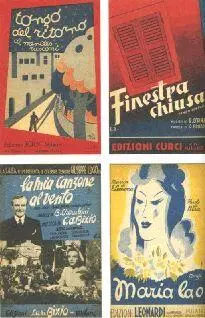
I was disturbed by the noise of a distant engine, maybe a car going through the valley. I felt a hint of tachycardia and said to myself: "It’s Pipetto!" As if someone had shown up precisely at the expected moment, someone whose arrival had disturbed me nonetheless. Who was Pipetto? It’s Pipetto , I kept saying, but once again it was just my lips that remembered. Just flatus vocis. I did not know who Pipetto was. Or rather, something in me knew, but that something was simmering slyly in the injured region of my brain.
An excellent topic for My Children’s Library: The Secret of Pipetto. Perhaps it was the Italian adaptation of The Secret of Lantenac ?
I racked my brain for the secret of Pipetto, and maybe there was no secret, except the one whispered to the world from a radio late at night.
9. But Pippo Doesn’t Know
____________________
Other days (five, seven, ten?) have blurred together in my memory, which is just as well, since what that left me with was, so to speak, the quintessence of a montage. I put disparate pieces of evidence together, cutting and joining, sometimes according to a natural progression of ideas and emotions, sometimes to create contrast. What resulted was no longer what I had seen and heard in the course of those days, nor what I might have seen and heard as a child: it was a figment, a hypothesis formed at the age of sixty about what I could have thought at ten. Not enough to say, "I know it happened like this," but enough to bring to light, on papyrus pages, what I presumably might have felt back then.
I had returned to the attic, and I was beginning to worry that none of my school things remained when my eyes lit upon a cardboard box, sealed with adhesive tape, on which appeared the words ELEMENTARY AND MIDDLE YAMBO. There was another, labeled ELEMENTARY AND MIDDLE ADA, but I did not need to reactivate my sister’s memory. I had enough to do with my own.
I wanted to avoid another week of high blood pressure. I called Amalia and had her help me carry the box down to my grandfather’s study. Then it occurred to me that I must have been in elementary and middle school between 1937 and 1945, and so I also brought down the boxes labeled WA R, 1940s, and FASCISM.
In the study, I took everything out and arranged it on various shelves. Books from elementary school, history and geography texts from middle school, and lots of notebooks, with my name, year, and class. There were lots of newspapers. Apparently my grandfather, from the war in Ethiopia on, had kept the important issues: the one with the historic speech by Mussolini proclaiming the birth of the Italian Empire, the one from June 10, 1940, with the declaration of war, and so on until the dropping of the atom bomb on Hiroshima and the end of the war. There were also postcards, posters, leaflets, and a few magazines.
I decided to proceed using the historian’s method, subjecting evidence to cross-comparison. That is to say, when I was reading my books and notebooks from fourth grade, 1940-41, I would also browse through the newspapers from the same years and, whenever I could, put songs from those years on the record player.
Because the books of the period were pro-Fascist, I had assumed that the newspapers would be, too. Everyone knows, for example, that Pravda in Stalin’s day didn’t provide the good citizens of the Soviet Union with accurate news. But I was forced to reconsider. As breathlessly propagandistic as the Italian papers could be, still they allowed readers, even in wartime, to figure out what was going on. Across a distance of many years, my grandfather was giving me a great lesson, civic and historiographic at once: You have to know how to read between the lines. And read between the lines he had, underscoring not so much the banner headlines as the inbriefs, the also-noteds, the news one might miss on a first reading. One issue of Corriere della Sera , from January 6-7, 1941, offered this headline: BATTLE ON THE BARDIA FRONT WAGED WITH GREAT FEROCITY. In the middle of the column, the war bulletin (there was one each day, a bureaucratic listing of such things as the number of enemy aircraft shot down) stated coolly that "other strongholds fell after courageous resistance from our troops, who inflicted substantial losses on the adversary." Other strongholds? From the context it was clear that Bardia, in North Africa, had fallen into British hands. In any case, my grandfather had made a note in red ink in the margin, as he had in many issues: "RL, lost B. 40,000 pris." RL apparently meant Radio London, and my grandfather was comparing the Radio London news with the official news. Not only had Bardia been lost, but forty thousand soldiers had been handed over to the enemy. As one can see, the Corriere had not lied, it had merely taken for granted the facts about which it had remained reticent. The same paper, on February 6, ran the headline OUR TROOPS COUNTERATTACK ON NORTHERN FRONT OF EAST AFRICA. What was the northern front of East Africa? Whereas many issues from the previous year, when giving news of our first inroads into Kenya and British Somalia, had provided detailed maps to show where we were victoriously trespassing, that article about the northern front gave no map, yet all you had to do was go look in an atlas to understand that the British had entered Eritrea.
Читать дальшеИнтервал:
Закладка:
Похожие книги на «The Mysterious Flame Of Queen Loana»
Представляем Вашему вниманию похожие книги на «The Mysterious Flame Of Queen Loana» списком для выбора. Мы отобрали схожую по названию и смыслу литературу в надежде предоставить читателям больше вариантов отыскать новые, интересные, ещё непрочитанные произведения.
Обсуждение, отзывы о книге «The Mysterious Flame Of Queen Loana» и просто собственные мнения читателей. Оставьте ваши комментарии, напишите, что Вы думаете о произведении, его смысле или главных героях. Укажите что конкретно понравилось, а что нет, и почему Вы так считаете.
